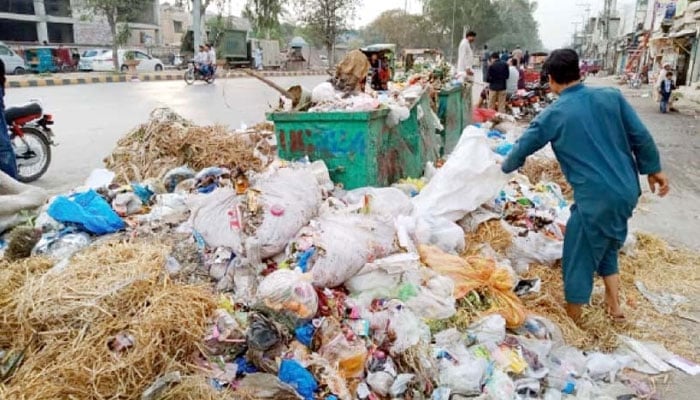Poor management of solid waste – a real threat to public health
Rawalpindi: The poor management of solid waste in most parts of the district is posing a greater health threat to the public as it increases the chances of breeding of mosquitoes and flies that may cause spread of a number of communicable diseases including dengue fever and malaria.
It is important that one can easily witness heaps of garbage, rubbish dumps and unnecessary water accumulations in a number of localities not only in congested urban areas of town but also in peri-urban and rural areas of the district. Rains and rising temperature add fuel to the fire by supporting hatching of mosquitoes’ eggs and breeding of flies at heaps of garbage and rubbish dumps.
The garbage dumps serving as potential breeding sites for mosquitoes and flies may cause outbreaks of serious infectious diseases including gastrointestinal infections and vector-borne diseases like dengue fever and malaria.
It is important that flies are recognized as carriers of easily communicable diseases. Flies collect pathogens on their legs and mouths when females lay eggs on decomposing organic matter such as feces, garbage and animal corpses. Flies carry diseases on their legs and the small hairs that cover their bodies. It takes only a matter of seconds for them to transfer these pathogens to food or touched surfaces.
Studies reveal that diseases carried by house flies include typhoid, cholera and dysentery. House flies have also been known to transmit the eggs of parasitic worms. Other diseases carried by house flies include salmonella, anthrax and tuberculosis. Though the flies do not primarily transmit TB but they can carry Mycobacterium tuberculosis while coming in contact with sputum of an infected person and then they can contaminate food or surfaces.
A number of link roads and streets in congested areas of the town particularly along both sides of Benazir Bhutto Road, in Rawal Town, have countless points being served as garbage dumps in open and the same is the situation along a number of link roads in Potohar Town and areas falling under the jurisdiction of cantonment boards.
The concerned government authorities in cantonment boards and city areas though following a waste management system but still a number of congested localities in town including Dhoke Elahi Bux, Chah Sultan, Dhoke Khabba, Arya Mohalla, Sadiqabad, Banni, Dhoke Chiraghdin, Rahimabad, Tamhasapabad, Peoples Colony, Tench Bhatta and the areas adjoining Raja Bazaar and Saddar markets could not be cleared of rubbish dumps and garbage.
It seems as none of the authorities have ever given attention to the clearing of the sites from garbage along rail tracks particularly from Marreer Chowk to Chaklala Railway Station. The garbage dumps and feces along rail tracks may cause the spread of a number of serious infections.
Health experts say that to avoid outbreaks of infectious diseases, the whole town is needed to be cleared of vectors causing these infections as vectors know no boundaries and infections can spread from one locality to the other. It is important that if a population in one locality is hit by a communicable infection, the population in the adjoining localities would also be at risk of contracting the infection.
Health experts say that bacteria grow faster in hot and humid weather conditions and if the concerned authorities fail in managing solid waste properly in all localities in Rawal Town.
-
 Lawyer Of Epstein Victims Speaks Out Directly To King Charles, Prince William, Kate Middleton
Lawyer Of Epstein Victims Speaks Out Directly To King Charles, Prince William, Kate Middleton -
 Microsoft CEO Shares How Gates Doubted $1bn OpenAI Investment
Microsoft CEO Shares How Gates Doubted $1bn OpenAI Investment -
 Milo Ventimiglia Calls Fatherhood 'pretty Wild Experience' As He Expects Second Baby With Wife Jarah Mariano
Milo Ventimiglia Calls Fatherhood 'pretty Wild Experience' As He Expects Second Baby With Wife Jarah Mariano -
 Chinese Scientists Unveil Advanced AI Model To Support Deep-space Exploration
Chinese Scientists Unveil Advanced AI Model To Support Deep-space Exploration -
 Anthropic’s New AI Tool Wipes Billions Off Cybersecurity Stocks
Anthropic’s New AI Tool Wipes Billions Off Cybersecurity Stocks -
 Trump Announces He Is Sending A Hospital Ship To Greenland Amid Rising Diplomatic Tensions
Trump Announces He Is Sending A Hospital Ship To Greenland Amid Rising Diplomatic Tensions -
 'Never Have I Ever' Star Maitreyi Ramakrishnan Lifts The Lid On How She Avoids Drama At Coffee Shops Due To Her Name
'Never Have I Ever' Star Maitreyi Ramakrishnan Lifts The Lid On How She Avoids Drama At Coffee Shops Due To Her Name -
 Inside Prince William’s Plans For Prince Harry: What Will Happen To Duke Once He’s King
Inside Prince William’s Plans For Prince Harry: What Will Happen To Duke Once He’s King -
 Chyler Leigh Pays Moving Homage To 'Grey’s Anatomy' Co-star Eric Dane: 'He Was Amazing'
Chyler Leigh Pays Moving Homage To 'Grey’s Anatomy' Co-star Eric Dane: 'He Was Amazing' -
 Did You Know Tech CEOs Limit Screen Time For Their Own Kids?
Did You Know Tech CEOs Limit Screen Time For Their Own Kids? -
 Matthew Lillard Admits Fashion Trends Are Not His 'forte'
Matthew Lillard Admits Fashion Trends Are Not His 'forte' -
 SpaceX Launches Another Batch Of Satellites From Cape Canaveral During Late-night Mission On Saturday
SpaceX Launches Another Batch Of Satellites From Cape Canaveral During Late-night Mission On Saturday -
 Princess Beatrice, Eugenie Get Pulled Into Parents’ Epstein Row: ‘At Least Stop Clinging!’
Princess Beatrice, Eugenie Get Pulled Into Parents’ Epstein Row: ‘At Least Stop Clinging!’ -
 Inside Kim Kardashian's Brain Aneurysm Diagnosis
Inside Kim Kardashian's Brain Aneurysm Diagnosis -
 Farmers Turn Down Millions As AI Data Centres Target Rural Land
Farmers Turn Down Millions As AI Data Centres Target Rural Land -
 Trump Announces A Rise In Global Tariffs To 15% In Response To Court Ruling, As Trade Tensions Intensify
Trump Announces A Rise In Global Tariffs To 15% In Response To Court Ruling, As Trade Tensions Intensify




